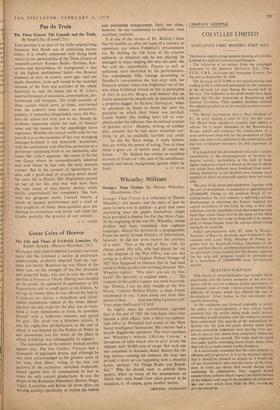Wheatley Militant
Stranger Than Fiction. By Dennis Wheatley. (Hutchinson, 25s.) Stranger Than Fiction is a collection of Dennis Wheatley's war papers; and the story of how he came to have any to publish—a great deal more interesting than the papers themselves—might have provided a chapter for Put Out More Flags. At the beginning of the war Mr. Wheatley, whose thrillers had been translated into eighteen languages, offered his services as a propagandist. From the newly formed Ministry of Information, however, he did not 'even receive the courtesy of a reply.' Then at the end of May, 1940, his chance came. His wife, who had placed her car at the disposal of the War Office, was one day acting as a driver to Captain Hubert Stringer of MI5 who happened to mention that he had been asked to think up ideas for resisting invasion. Mrs. Wheatley replied : 'Why don't you ask my hus- band? His speciality is original ideas. . . .' The response to the author's paper was most encourag- ing. 'Dennis, I am on duty tonight at the War House,' Colonel Balfour-Davey, a close friend, telephoned to say. 'Come along any time after eleven o'clock. . . . And one thing I promise you. Your paper shall reach VCIGS.'
So highly were his contributions regarded that at the end of 1941 the free-lance ideas man became a pilot officer, with a thirty-by-eighteen- foot office in Whitehall and access to the Most Secret Intelligence Summaries. His schemes had a boyish. Biggles-like optimism. The most ingenious was 'Wheatley's Atlantic Life-Line Convoy,' a formation of rafts which was to drift across the Atlantic with 50,000 tons of cargo. But each one was visualised in dramatic detail. Before the vil- lage defence meeting, for instance, the vicar was to hold a short service beginning with a cheerful hymn, 'perhaps "All Things Bright and Beauti- ful."' Why he should want to publish these papers, when so many of the assumptions on which they were based have since proved to be mistaken, is, of course, quite another matter.
CiSOFFREY NICIIOLSON






































 Previous page
Previous page